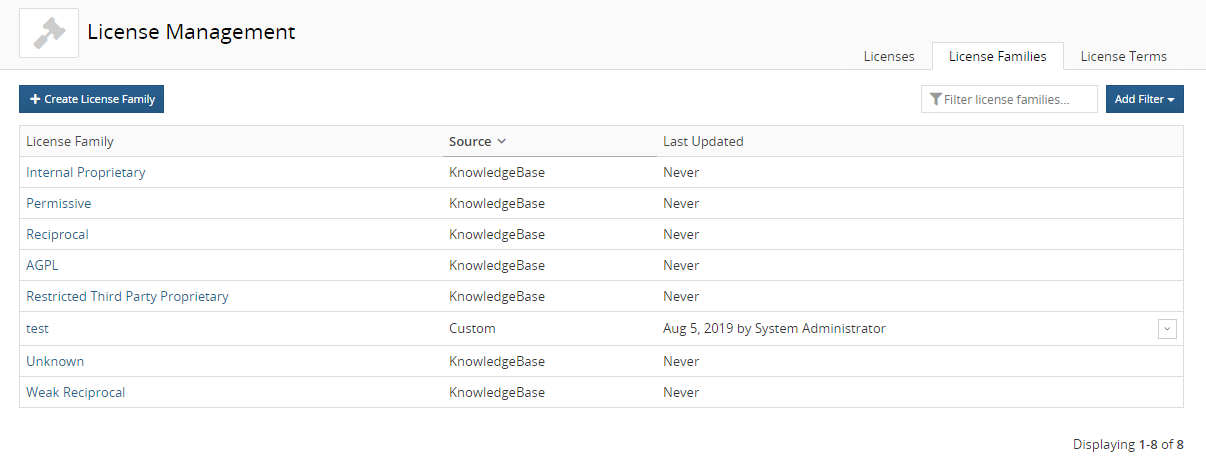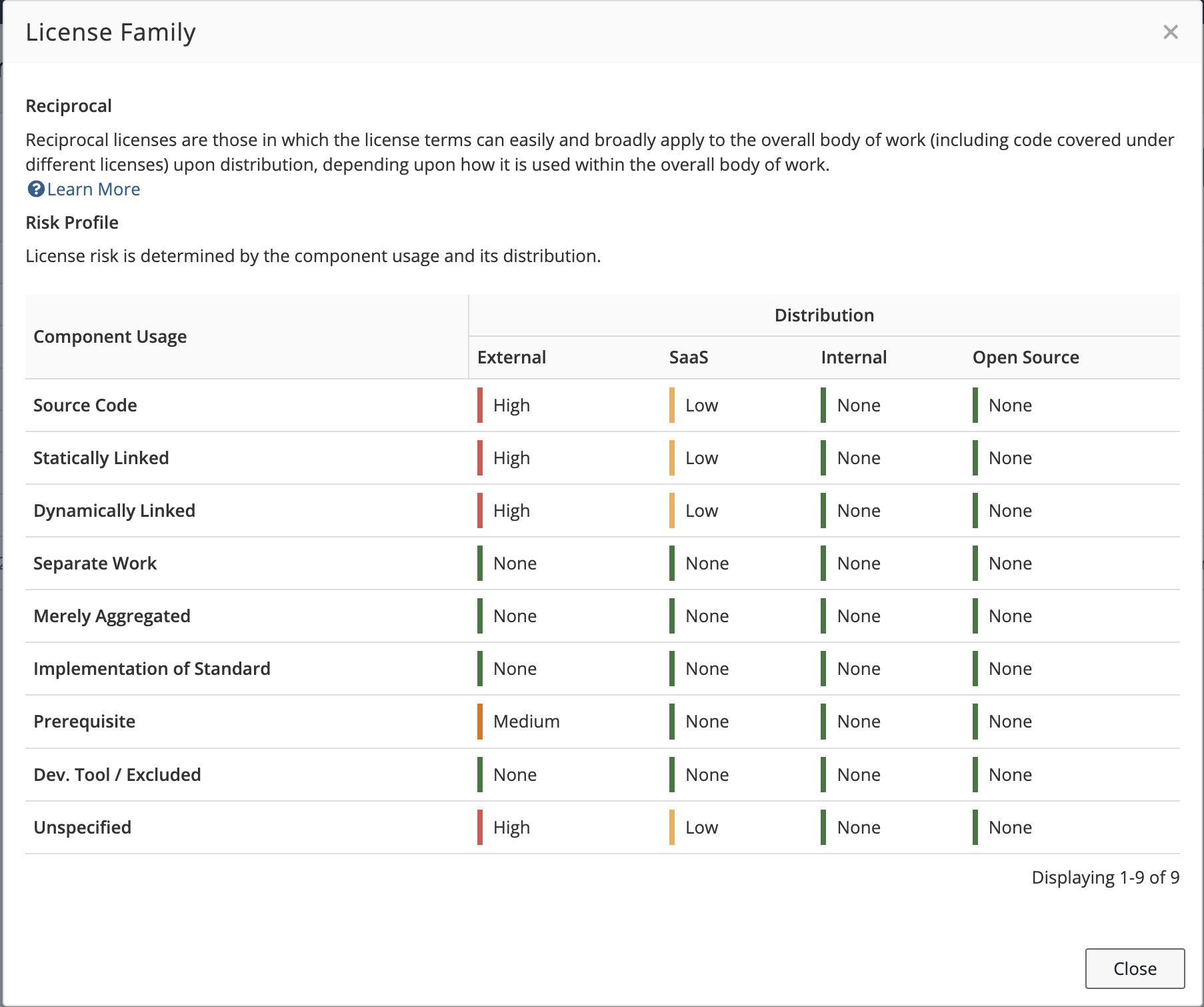About license families
The use of open source software is managed through licenses that allow the software to be utilized, modified, and/or shared under defined terms and conditions. The conditions regarding the reuse of open source software can vary from things you can do (rights), things you cannot do (restrictions) and things you must do (obligations) in order to comply with the license. Black Duck tracks over 2,900 open sources licenses that can range from those with few restrictions and obligations to those with many restrictions and obligations.
Depending upon the nature of these restrictions and obligations, some licenses are deemed to be riskier than others, as they require more management and care to ensure compliance with the license terms. Typically, the riskiest licenses are those that are reciprocal in nature. Reciprocal licenses, often pejoratively called “Viral Licenses”, are those in which the license terms can extend beyond the open source code itself and can try to apply to other code as well. The other code could be modifications to the open source, or even simply code that uses the open source code in a way that triggers the reciprocal nature of the licenses. Once triggered, it is possible that in order to be in compliance to the license, developers who create software applications may need to treat the entire application as under the open source license and comply with all these obligations for the entire application. This could include the obligation to provide all the source code for the application (not just the open source) and allowing people who receive the application to modify and redistribute it without restrictions. This may be in conflict with a proprietary license model.
Please note, the legal aspects of managing open source licenses can be complicated and often it is best to seek legal counsel when making decisions about open source licenses and creating policies regarding their use. Legal counsel can best help determine if the license rights, restrictions, and obligations apply in a particular scenario. However, in order to help customers manage these risks in a simple and effective way, Black Duck categorizes open source licenses into license families for purposes of risk calculations and the definition of open source policy rules. These families range from those that are highly reciprocal to those with few obligations and restrictions. These license families, called KnowledgeBase licenses are:
-
Restrictive Third Party Proprietary
Licenses in the Restrictive Third Party Proprietary family are for the licenses which cover other company’s commercial proprietary code. Typically Restrictive Third Party Proprietary licenses have restrictions on the use of the code and can be risky.
-
Permissive
Permissive Licenses tend to not place restrictions on the use of the open source code and generally have few obligations. Companies, for the most part, view these licenses as easy to manage and non-risky.
-
Reciprocal
Reciprocal licenses are those in which the license terms can easily apply to the overall body of work (like the AGPL) depending upon how it is used. However, typically the reciprocal nature of the license is triggered by distribution. Therefore, companies who distribute software in some fashion are generally concerned with highly managing software under these types of licenses.
-
Internal Proprietary
Licenses in the Internal Proprietary family are typically for your licenses which are used to cover your company-owned proprietary software. Licenses in this family tend to not place restrictions on your use of the code and are generally not very risky when you use code with licenses in this family.
-
Unknown
In this case, Black Duck was unable to determine the license for a component. Additional review should be done to determine the license for this component.
-
Weak Reciprocal
Licenses in this family can be reciprocal, but they are intended for open source software that is expected to be combined with other software under other licenses and therefore they tend to have a smaller reach. In this case, depending upon how the software is used, the reciprocal nature may simply cover modifications to the OSS and do not necessarily apply to the whole body of work. Companies who distribute software generally need to be keenly aware of these licenses, but tend to allow usage of components under these licenses with guidelines as to how they can be used. Staying in compliance and not triggering the reciprocity of the license tends to be easier.
-
AGPL (Affero General Public License)
Licenses in the AGPL family tend to be highly reciprocal. The reciprocity can be easily triggered depending upon how the component is incorporated into the overall body of work and how much the original work is based upon the open source code. In addition, the obligations can apply when software is exposed over a network (for example, the internet). Companies who distribute software applications (either on a device or as media/downloads) or create software as a service (SaaS) applications need to pay particular attention to software under these licenses in order to ensure compliance.
The following table shows the license family for the top 20 open source licenses used in open source projects:
| License Family |
Examples |
|---|---|
| Affero General Public License (AGPL) |
|
| Reciprocal |
|
| Weak Reciprocal |
|
| Permissive |
|
| Unknown | N/A |
Managing license families
Users with the License Manager role can use the License Families page to manage their license families. From this page you can view the KnowledgeBase license families or create custom license families.
To view the License Families page:
-
Log in to Black Duck with the License Manager role.
-
Click
 → Licenses Families.
→ Licenses Families.
The table contains the following information:
-
License Family. The name of the license family category.
-
Source. The source for this license. Possible values are:
-
KnowledgeBase. From Black Duck KnowledgeBase.
-
Custom. Custom license family.
-
-
Last Updated. The date that the license family was created or last updated and the username of the user who created or last updated this license family.
Use the License Family Source filter to limit the information shown on this page. Filter options are Custom or KnowledgeBase.
-
-
Click the desired license family. This will open a modal displaying the following information:

-
License family category. The description for this license family. Categories include Restrictive Third Party Proprietary, Permissive, Reciprocal, Internal Proprietary, Unknown, Weak Reciprocal, AGPL.
-
Risk Profile. The license risk as determined by the component usage and its distribution.
-
